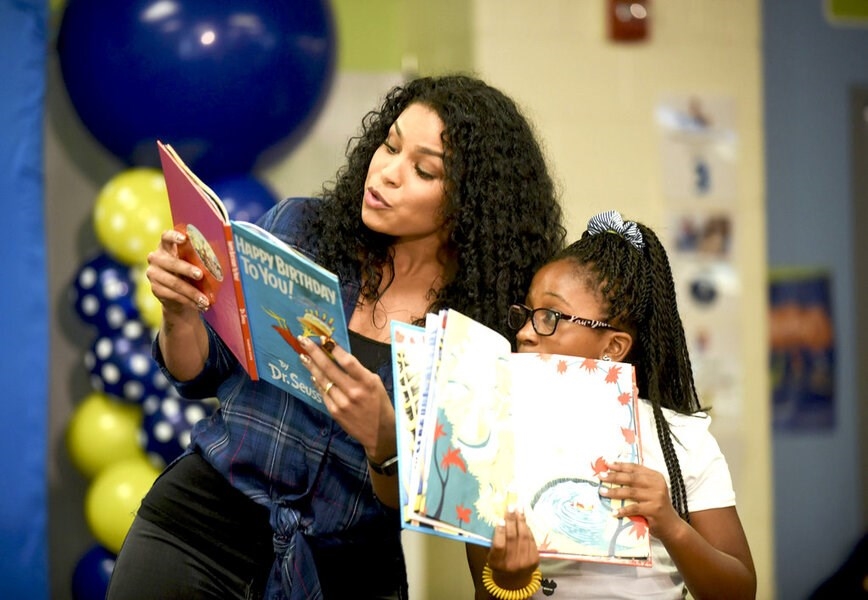REPRINTED WITH PERMISSION FROM THE CHRISTIAN SCIENCE MONITOR
A British survey measures youthful joy in verse, establishing a basis for happiness that lasts a lifetime.
 Singer and actress Jordin Sparks reads from Dr. Seuss’ “Happy Birthday to You!” with a student in Washington, D.C. during Reading is Fundamental’s 50th Anniversary in 2016. AP
Singer and actress Jordin Sparks reads from Dr. Seuss’ “Happy Birthday to You!” with a student in Washington, D.C. during Reading is Fundamental’s 50th Anniversary in 2016. AP
When English novelist Frank Cottrell-Boyce was asked to prepare the opening ceremony for the 2012 Olympic Games in London, he took a poll of the workers – from all over the world – who were building the sports stadiums. “When you think of Britain, what do you think of?” he asked. The most common answers included characters from children’s books. “Winnie-the-Pooh, Harry Potter, Mary Poppins ... they just started listing characters,” he told The Times.
A dozen years later, that lasting imprint of childhood imagination is reflected in a poll of 5,000 British children ages 8 to 16. It found half engaged regularly with poetry, whether by reading, writing, performing, or listening to it read aloud. The survey, by the British National Literacy Trust, found that children from poorer families were more apt to enjoy the rhythmic delights of poetry than those from wealthier homes. And the younger the listener, the keener the ear.
The study coincides with a renaissance of youthful enthusiasm for metaphor and euphemism driven through popular culture. The Globe Theatre in London engaged 48,000 children this year in a poetry performance competition. Michael Rosen, one of Britain’s most beloved children’s authors currently working, has 142 million views of his YouTube channel for poetry readings.
In some countries, rap is now a staple of college literature courses. So is Taylor Swift. “I love it, because it’s like she’s training the literary critics out there to do the work,” Elizabeth Scala, a professor who teaches a course in the literary devices of Ms. Swift’s lyrics at the University of Texas at Austin, told EducationWeek.
Some American high schools are turning to poetry to help students cope with social issues like gun violence, identity, and loneliness. That approach underscores the ability of the word, whether written or spoken, to cultivate empathy, innocence, and a confidence that excellence is innately possible.
“None of us have the slightest idea about what the future holds for our children,” Mr. Cottrell-Boyce, newly appointed as Britain’s children’s laureate, told The Times. But the “experience of being read to in your early years and of finding consolation in a book – that builds the apparatus of happiness in the child.” It is a happiness that can stir the heart decades later, as the construction workers for the Olympics informed Mr. Cottrell-Boyce.
Page created on 10/4/2024 8:29:42 PM
Last edited 10/4/2024 8:36:34 PM
